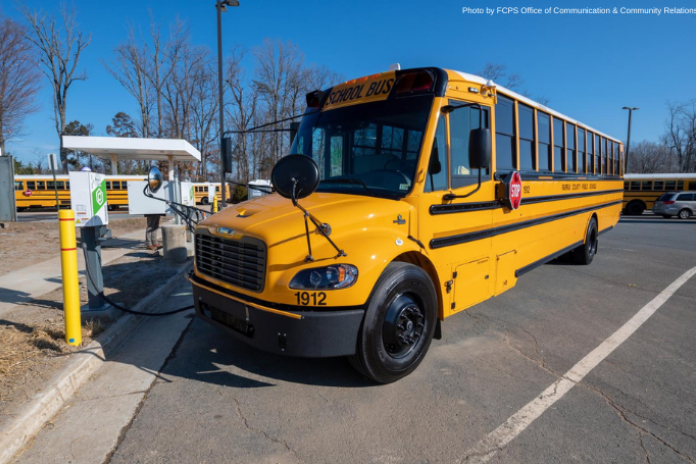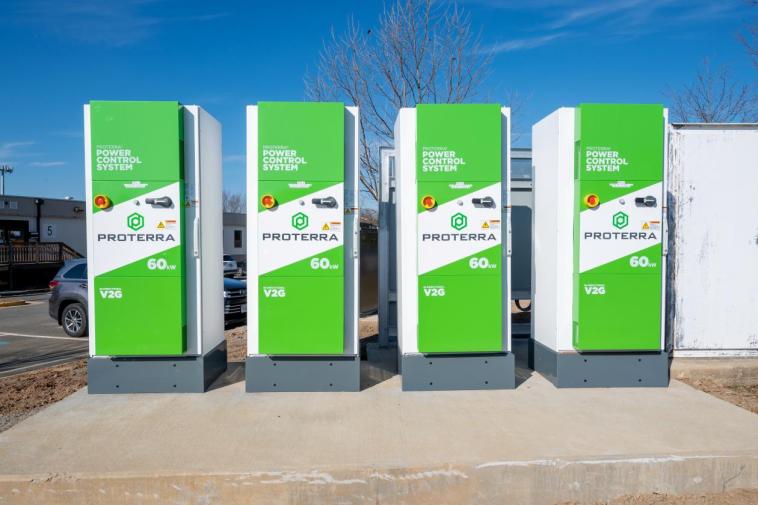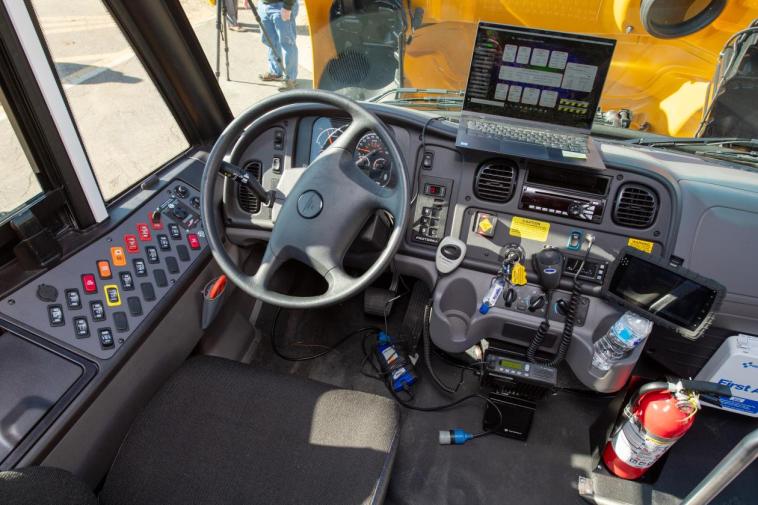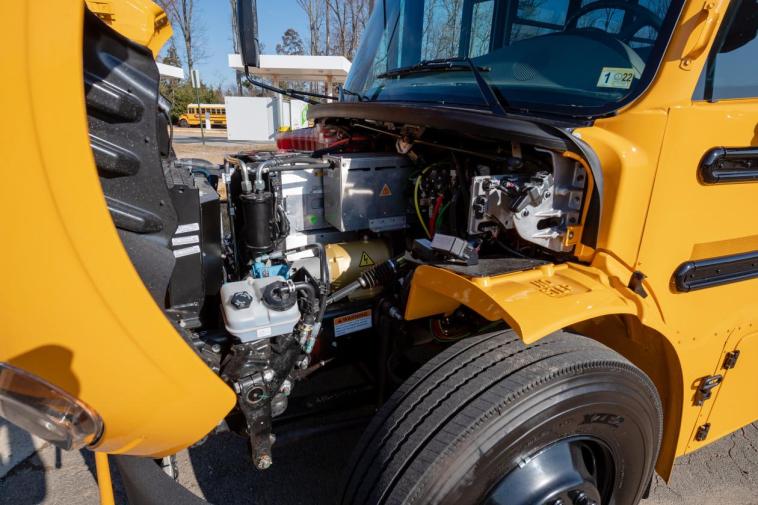An Electrifying Partnership in Fairfax County, Virginia Delivers Clean Rides

In collaboration with partners and communities, WRI’s Electric School Bus Initiative aims to build unstoppable momentum toward an equitable transition of the U.S. school bus fleet to electric, bringing health, climate and economic benefits to children and families across the country and normalizing electric mobility for an entire generation. The Electric School Bus Series shows how superintendents and fleet managers across the United States have pursued school bus electrification in their own communities. This edition covers Fairfax County Public Schools in Virginia, who is collaborating with their electric utility, Dominion Energy, to transition its fleet to electric school buses.
This piece is based off an interview with Francine Furby, Transportation Director for Fairfax County Public Schools, and consultant to the district, Rebecca Peters.
The Fairfax County School Board has set its sights on achieving carbon neutrality by 2040. To support this effort, Fairfax County Public Schools (FCPS) has set its own goal to completely transition its 1,625 school buses to electric or zero-carbon alternatives by 2035. With eight electric school buses in operation today and 10 more to come, the eighth largest school bus fleet in the country is on its way to electrifying trips for its 140,000 student riders and its drivers.
Motivation & Co-benefits
Student health and welfare are a top objective for the Fairfax County School Board and Board of Supervisors. As such, the two created a Joint Environmental Task Force (JET) in 2019 to address climate change and sustainability. In its recommendations released the following year, the JET described that diesel bus emissions cause and exacerbate respiratory diseases, such as asthma, and offered the health and climate benefits of transitioning from diesel use. In June 2021, the school board accepted the recommendation to set a carbon neutral goal.
According to Francine Furby, FCPS Transportation Director, and consultant Rebecca Peters, FCPS assesses options for reducing the environmental impact of its school bus fleet each year. Advancements in electric bus technology stood out, particularly with the availability of grant programs that could bring down the cost.
In the fall of 2019, FCPS applied for an electric bus through a program offered by its electric utility, Dominion Energy. Through the program, Dominion Energy awarded FCPS eight electric Thomas Built Buses for which the school district paid only $130,000 of each bus’s $376,000 price tag. Dominion Energy covered the incremental cost of transitioning from a diesel to electric school bus ($1.968 million total for FCPS) and provided the charging infrastructure. Separately, FCPS also pursued Volkswagen Settlement funding from Virginia’s Department of Environmental Quality and received $2.65 million, which covered the cost difference between 10 diesel and electric buses, while Dominion will provide the charging infrastructure. The additional 10 buses are expected to arrive in spring 2022.
Partners and Advocates
Utilities can serve as an essential partner for school districts transitioning to electric buses. Phase 1 of Dominion Energy’s Electric School Bus program provided 50 electric school buses and related charging infrastructure to 15 school districts across the utility’s Virginia service area, including FCPS. Phase 1 of the program is funded through the utility’s current base rates, which means no increased cost to customers to implement the program. After assessing geographic and equity considerations, Dominion Energy made final decisions on school district awards based on the value the buses and their batteries would add to the grid. Through the program, Dominion Energy provides advisory services such as education and technical support, selects the electric school bus provider, covers the incremental cost between a standard and an electric school bus, and assists with and covers the cost of charging infrastructure. The company continues to explore ways to expand the program beyond Phase 1.
The program is structured so that Dominion Energy owns the bus batteries and propulsion systems and maintains the charging infrastructure for the eight buses they provide. This structure reduced initial costs and eliminated some of the charging infrastructure responsibilities. Dominion maintains the ability to utilize the buses as grid assets, and while they have not yet employed the buses for vehicle-to-grid (V2G) applications, FCPS’s Energy Management professionals are monitoring this potential use.

In addition to this utility support, Director Furby also recognized the influence that climate-conscious stakeholders — such as the school board, board of supervisors, the superintendent, the governor and local organizations like Mothers Out Front (MOF) and Virginia Clean Cities — can exert in spearheading electrification. For example, Bobby Monacella, team lead of MOF Fairfax, noted the power of moms in advocating for the future and wellbeing of their children, stating that “no one has more power to advocate for that than you.”
MOF worked early with two school board members, who then brought school bus electrification to the entire board for consideration. Throughout the process, MOF provided research and data, testified on equity considerations and health impacts of diesel on their children, and spoke with FCPS’ transportation team about their challenges. After the successful adoption of a long-term electrification goal in Fairfax County, MOF Fairfax used this experience to inform a state-wide strategy; the group worked closely with Virginia Delegate Mark Keam to develop House Bill 2118, which passed in March 2021. MOF and others are now working to secure funding for the Clean School Bus Grant Fund.

Implementation Status
Dominion Energy, the School Board and FCPS agreed on a charging site owned by the school district that had high V2G potential while still meeting FCPS’ transportation needs. Then, FCPS selected routes for the electric school buses based on charging availability. The district began with routes that were less than 70 miles a day, although the buses can travel more than 134 miles on a charge. Finally, the school district surveyed drivers and provided training for those interested. Drivers quickly adapted to the new technology and now enjoy the quieter bus. One driver called the experience smooth and relaxing, reducing the wear and tear on her body.
So far, around 1,200 students have ridden on the electric buses.
In the fall of 2021, FCPS issued a request for information (RFI) on available bus offerings beyond their initial 18 buses and received 20 responses from a combination of vendors, software providers, charging station providers, consulting and project management firms and turn-key providers. FCPS looks forward to exploring more bus models and evaluating other charging locations, which could help bring electric buses and the benefits of reduced pollution to other areas in the county.
Drivers quickly adapted to the new technology and now enjoy the quieter bus. One driver called the experience smooth and relaxing, reducing the wear and tear on her body.
Greatest Challenges
Besides minor operational issues with the charging stations, Furby reported that FCPS has not had any major challenges throughout their electric school bus adoption process. Drivers have learned operational steps — such as not charging the battery fully to 100% to protect its longevity — and adjusted along the way. To help with this transition when buses first arrived, Thomas Built Buses partnered with a local dealer and battery manufacturer to provide drivers and first responders with training and information at the maintenance facilities.

FCPS has found that cold winter weather impacts bus range and makes operational adjustments necessary, particularly on days when temperatures are at or below freezing. To avoid emissions from auxiliary diesel heaters, the school district uses the bus battery to provide heat. These heaters pull energy from the battery and, in rare cases when drivers have an unplanned trip on very cold days, the state of charge has dropped below 20%, impacting performance and heat use. As FCPS advances toward full fleet electrification by 2035, it continues to develop operational best practices across seasons.
Looking ahead, funding large-scale electrification will be a substantial undertaking given the size of the school district’s fleet. It will also take many years, given the annual turnover of 100 vehicles per year, and financing strategies will prove important. With an average bus lifespan of 15 years, a 15-year extended battery warranty – for which Dominion is covering the cost for seven extra years of coverage for each of the 18 buses – provides assurance that these buses will be supported in the long-term.
Advice for Other School Districts
FCPS found success thanks to the enthusiastic buy-in of the district’s drivers and bus driver supervisor. Small acts like applauding drivers can go a long way: FCPS included driver names on the program at the ribbon cutting ceremony to acknowledge their vital role.
As a concluding message to school districts exploring a path to electric buses, Furby advised that they “definitely embrace it.” Establishing partnerships, especially with the local utility and with community groups, and having leadership on board is critical. Bobby Monacella of Mothers Out Front Fairfax echoed this point, advising community members to identify decision-makers (e.g., the school board) and find a champion who can advocate for electric buses. Lastly, Furby suggested speaking with school districts that have started going electric to understand their experience, lessons learned and tips for better integration.
Additional Resources:
- Dominion Electric School Buses
- Virginia Department of Environmental Quality Volkswagen Settlement Agreement
- Fairfax County School Board Sets Goal for Carbon Neutral Energy Use by 2040
- Go for Green: First Electric School Bus Fleet Rolled Out to Support FCPS Carbon Neutral Goal
- FCPS Electric School Bus – Garage and Bus Video
- Fairfax Joint Environmental Task Force
Want to learn more from the Electric School Bus Series? Explore more stories here.
Mothers Out Front is a sub-grantee of WRI.